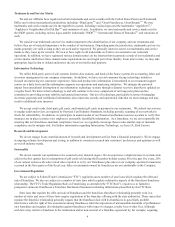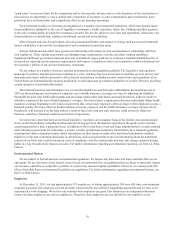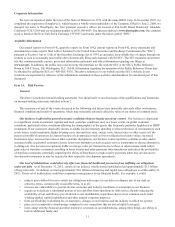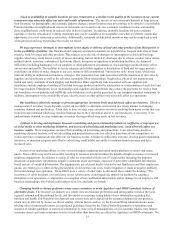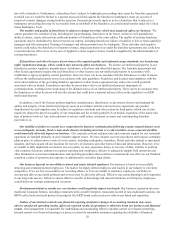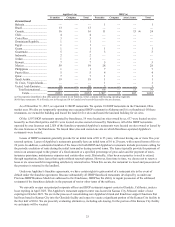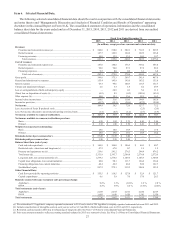IHOP 2015 Annual Report Download - page 39
Download and view the complete annual report
Please find page 39 of the 2015 IHOP annual report below. You can navigate through the pages in the report by either clicking on the pages listed below, or by using the keyword search tool below to find specific information within the annual report.19
related franchise agreements and development agreements. Any franchisee that is experiencing financial difficulties may also
be unable to participate in implementing changes to our business strategy. Any franchisee that owns and operates a significant
number of Applebee's restaurants and fails to comply with its other obligations under the franchise agreement, such as those
relating to the quality and preparation of food and maintenance of restaurants, could cause significant harm to the Applebee's
brand and subject us to claims by consumers even if we are not legally liable for the franchisee's actions or failure to act.
Development rights for Applebee's restaurants are also concentrated among a limited number of existing franchisees. If any of
these existing franchisees experience financial difficulties, future development of Applebee's restaurants may be materially
adversely affected.
We are subject to credit risk from our IHOP franchisees operating under our Previous IHOP Business Model, and a
default by these franchisees may negatively affect our cash flows. Of the 1,441 IHOP restaurants subject to domestic
franchise agreements as of December 31, 2015, slightly less than half operate under the Previous IHOP Business Model. The
Company was involved in all aspects of the development and financing of the IHOP restaurants established prior to 2003.
Under the Previous IHOP Business Model, the Company typically identified and leased or purchased the restaurant sites, built
and equipped the restaurants and then franchised them to franchisees. In addition, IHOP typically financed as much as 80% of
the franchise fee for periods ranging from five to eight years and leased the restaurant and equipment to the franchisee over a
25-year period. Therefore, in addition to franchise fees and royalties, the revenues received from an IHOP franchisee operating
under the Previous IHOP Business Model include, among other things, lease or sublease rents for the restaurant property
building, rent under an equipment lease and interest income from the financing arrangements for the unpaid portion of the
franchise fee under the franchise notes. If any of these IHOP franchisees were to default on their payment obligations to us, we
may be unable to collect the amounts owed under the building property lease/sublease agreement and our notes and equipment
contract receivables, as well as outstanding franchise royalties. The additional amounts owed to us by each of these IHOP
franchisees subject us to greater credit risk and defaults by IHOP franchisees operating under our Previous IHOP Business
Model and may negatively affect our cash flows.
Franchisees may breach the terms of their franchise agreements in a manner that adversely affects our
brands. Franchisees are required to conform to specified product quality standards and other requirements pursuant to their
franchise agreements in order to protect our brands and to optimize restaurant performance. However, franchisees may receive
through the supply chain or produce sub-standard or non-compliant food or beverage products, which may adversely impact the
reputation of our brands. Franchisees may also breach the standards set forth in their respective franchise agreements.
Franchisees are subject to potential losses that are not covered by insurance that may negatively impact their ability to
make payments to us and perform other obligations under franchise agreements. Franchisees may have insufficient
insurance coverage to cover all of the potential risks associated with the ownership and operation of their restaurants. A
franchisee may have insufficient funds to cover future unanticipated increases in insurance premiums or losses that are not
covered by insurance. Certain extraordinary hazards may not be insurable and insurance may not be available (or may be
available only at prohibitively expensive rates) with respect to many other risks. Moreover, there is no assurance that any loss
incurred will not exceed the limits on the policies obtained, or that claim payments on such policies will be received on a timely
basis, or even if obtained on a timely basis, that such payments will prevent losses to such franchisee or enable timely franchise
payments. Accordingly, in cases in which a franchisee experiences increased insurance premiums or must pay claims out-of-
pocket, the franchisee may not have the funds necessary to make franchise and other payments to us.
We are subject to risks associated with self-insurance for medical benefits. In January 2016, we began self-insuring our
employee medical benefits. We maintain individual stop loss coverage but do not maintain coverage at an aggregate level. Our
reserves are based on historical loss trends that may not correlate to actual loss experience in the future. If we experience an
unexpectedly large number of claims that result in costs or liabilities in excess of our projections, our reserves may prove to be
insufficient and we may be exposed to significant and unexpected losses. For these and other reasons, including our inability to
renew stop loss coverage at competitive rates, we are subject to risks associated with self-insurance that may have an adverse
effect on Corporation’s financial condition and operating results.
In addition, access to personal medical information is regulated by federal, state and/or local laws as well as by certain
third-party agreements. If our security and information systems or the systems of our third party vendors are compromised, we
could be subject to costly litigation or penalties and our reputation and operations could be adversely affected.
An insolvency or bankruptcy proceeding involving a franchisee could prevent the collection of payments or the exercise
of rights under the related franchise agreement. An insolvency proceeding involving a franchisee could prevent us from
collecting payments or exercising any of our other rights under the related franchise agreement. In particular, the protection of
the statutory automatic stay that arises under Section 362 of the United States Bankruptcy Code upon the commencement of a
bankruptcy proceeding by or against a franchisee would prohibit us from terminating a franchise agreement previously entered


